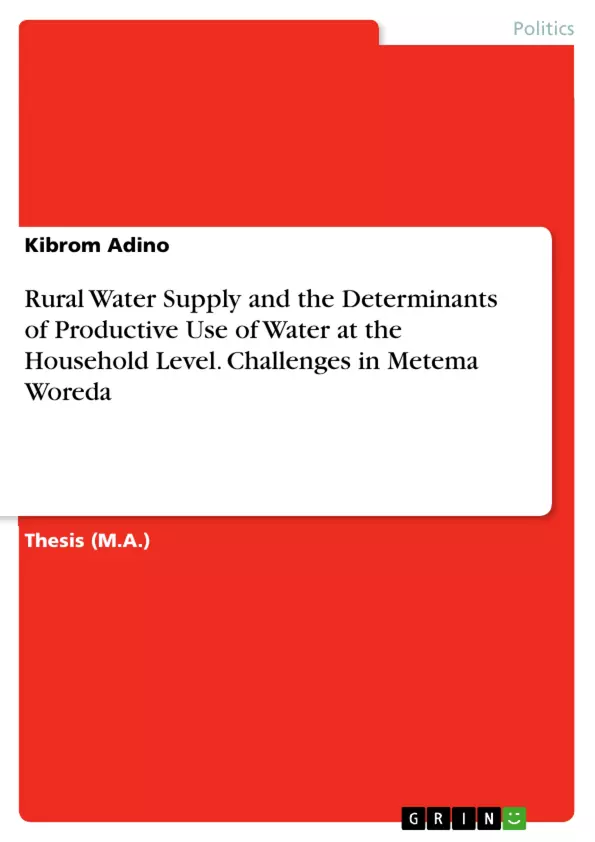These days, water has become a highly essential ingredient for the rural household’s home based productive use of water beyond the usual basic needs of consumption. In recognition of this, this study is aimed at three main objectives: assessment of the home based productive use of water, the factors that affect the productive use and examining the major challenges of rural water supply in the study area.
In an attempt to deal with these objectives the study selected Metema Woreda in Ethiopia as a study area from which four kebeles were selected randomly to have 130 household respondents. The major methods of analysis in this study were both descriptive analysis and a logistic model to meet on the aforementioned objectives.
The analysis and discussion of the study revealed that water is the prime input for home based productive uses in addition to the usual basic needs of consumption. To this effect, traditional brewery, home gardening, water selling, small ruminants and rural restaurants were the major home based productive uses of water in the study area. Yet the productive use of water in the study area was found to be constrained by demographic and economic characteristics of the households and the physical and environmental situation of the water supply of the area. Moreover, the study recognized that the water supply in the study area is hindered by a combination of institutional, physical, and technical challenges. Hence, in recognition to these, the concerned bodies at all levels should recognize the challenges of rural water supply as multiple and interlocking that requires a systematic approach. Moreover, the productive use of water at household level should be mainstreamed in the policy of rural water supply and management efforts of the country as equally important as the irrigation sector.
Frequently asked questions
What is the purpose of this document?
This document appears to be a language preview for academic use, providing a title, table of contents, objectives, key themes, chapter summaries, and keywords related to a study. The OCR data is likely intended for analyzing themes in a structured manner.
What is the study focused on?
The study, titled "Rural Water Supply and the Determinants of Productive use of Water at Household Level: The Case of Metema Woreda, North Gondar, Amhara Regional State," investigates the challenges of rural water supply and the factors influencing the productive use of water at the household level in the Metema Woreda region of Ethiopia.
Where is Metema Woreda located?
Metema Woreda is located in North Gondar, Amhara Regional State, Ethiopia. It is 900 km northwest of Addis Ababa and approximately 180 km west of Gondar town.
What are the main objectives of the study?
The study has three main objectives:
- To assess the primary home-based productive uses of domestic water by rural households.
- To investigate the factors affecting home-based productive use of water.
- To examine the major challenges affecting rural water supply.
What research methods were used in the study?
The study used a mixed-methods approach, including descriptive analysis and logistic regression modeling. Data was collected through household surveys, focused group discussions (FGDs), and key informant interviews (KIIs).
What are some of the key concepts discussed in the document?
Key concepts include consumptive versus productive uses of water, supply-side versus demand-driven approaches to water supply and management, the link between water, livelihood, and poverty, and the importance of multi-use systems (MUS).
What are some identified challenges to rural water supply?
Identified challenges include technical issues, infrastructural problems, environmental factors (such as erratic rainfall), and institutional issues such as lack of community participation and ineffective water committees.
What are some adaptive mechanisms used by households facing water scarcity?
Adaptive mechanisms mentioned include treating unimproved water, postponing certain water-dependent activities, and water storage.
What is the conceptual framework used for the study?
The conceptual framework considers the interplay between basic needs for water, demographic factors, economic factors, physical and environmental factors, and institutional factors in determining productive use of water.
What are some of the factors that determine whether a household engages in productive use of water?
Factors include the sex and age of the household head, total family size, income, access to training, distance to water sources, and price of water.
- Quote paper
- Kibrom Adino (Author), 2013, Rural Water Supply and the Determinants of Productive Use of Water at the Household Level. Challenges in Metema Woreda, Munich, GRIN Verlag, https://www.grin.com/document/334656



